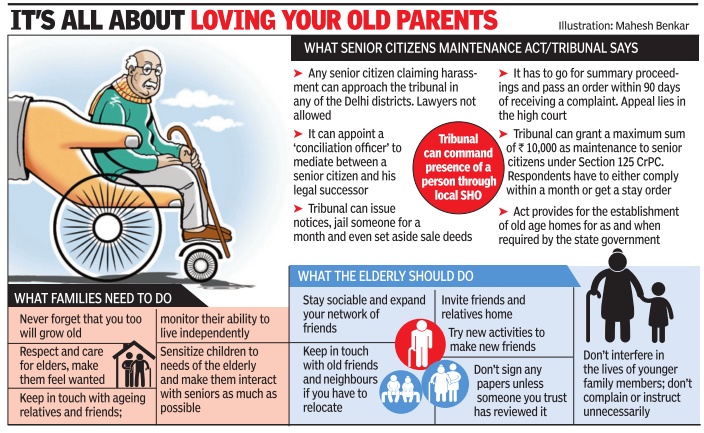Parents, children and the law: India

This is a collection of articles archived for the excellence of their content. |
Stepsons must help childless stepmother: HC
The Times of India, Jul 18 2015
Chhattisgarh high court has upheld that a childless stepmother is entitled to maintenance from her stepsons.
A single bench of Justice Sanjay K Agrawal dismissed a criminal revision petition filed by Deenbandhu and Kanwar Lal, questioning the order of a family court in Kanker district that directed a 70-year-old woman to get maintenance of Rs 1,000 from her stepson.
Petitioners counsel D N Prajapathi argued that Section 125 of code of criminal procedure code, 1973, does not include the stepmother, who is unable to maintain herself.Non-applicant Birajo Bai's counsel supported the order of family court, citing judgments of other high courts.
Adult sons
No legal right to stay in parents' house
Adult son has no legal right to stay in parents' house: HC, Nov 30, 2016: The Times of India
An adult son has no legal right to stay in his parents' self-acquired property , the Delhi high court has ruled while upholding the wishes of an old couple who wanted their son and daughter-in-law evicted from their house.
Justice Pratibha Rani upheld the decision of the trial court, which too had ruled in favour of the parents. The court said a person can reside in his or her parents' house only at their “mercy“.
The court said just because the parents had let the son live in their house when relations were cordial didn't mean they had to bear his “burden“ throughout his life.
“Where the house is self-acquired by the parents, the son, whether married or unmarried, has no legal right to live there. He can stay at the parents' mercy up to the time they allow it,“ said the order, delivered early this month.
The case had come to the high court after the son challenged the order of a trial court in favour of the parents.
The parents, both senior citizens, had told the lower court that both their sons and daughters-in-law, who were living with them on the first and second floors respectively, had made their “life hell“. The couple had filed police complaints against them and issued public notices in 2007 and 2012 disowning the children. “Merely because the parents have allowed him to live in the house so long as his relations with them were cordial does not mean that they have to bear his burden throughout his life,“ the court observed.
The sons had refuted the allegations and claimed that they were co-owners of the property as they had contributed towards its purchase and construction. However, the sons failed to produce proof that they invested in the parents' property .
In the order, Justice Rani noted that the sons were unable to prove that they were co-owners of the property , while the parents produced the relevant papers, such as the general power of attorney , agreement to sell, possession letter, affidavit, etc.